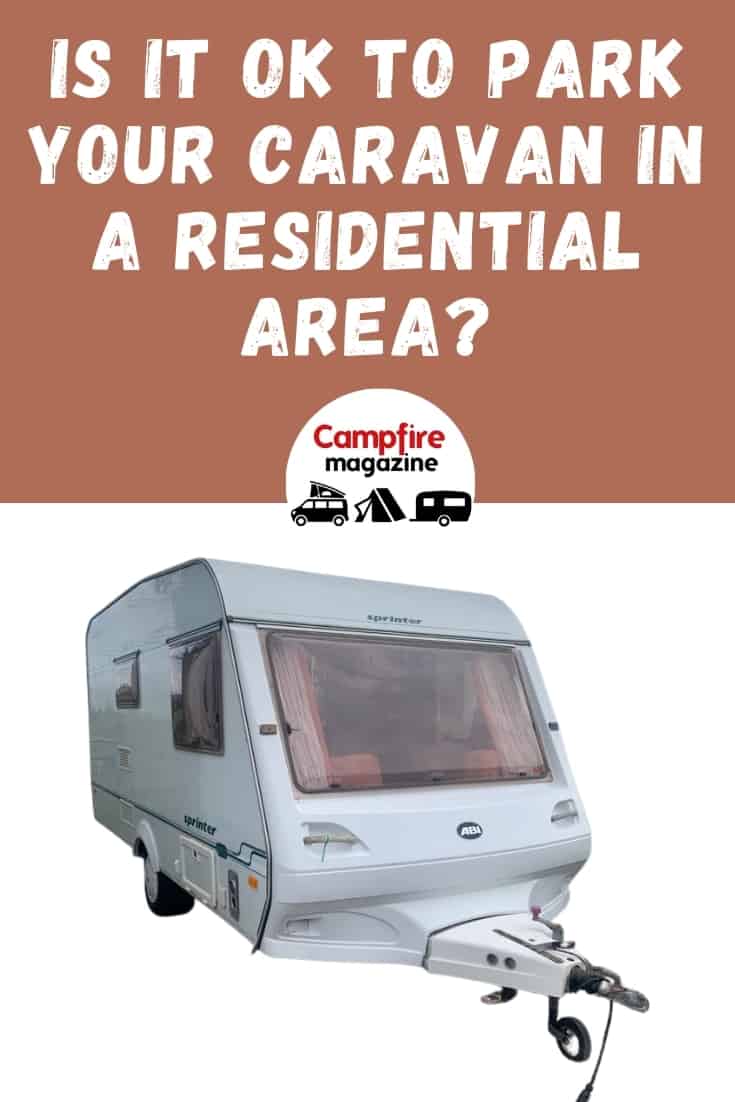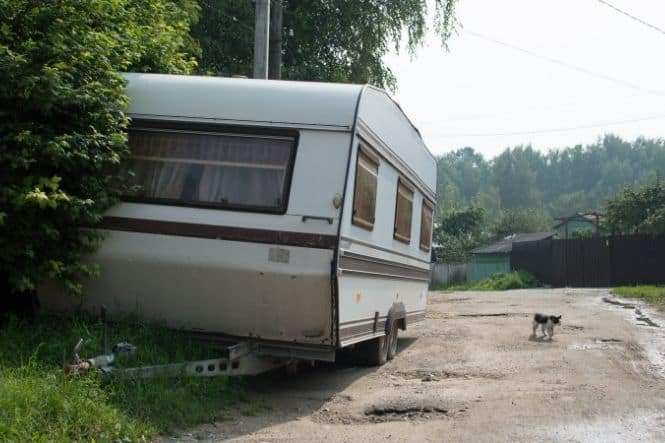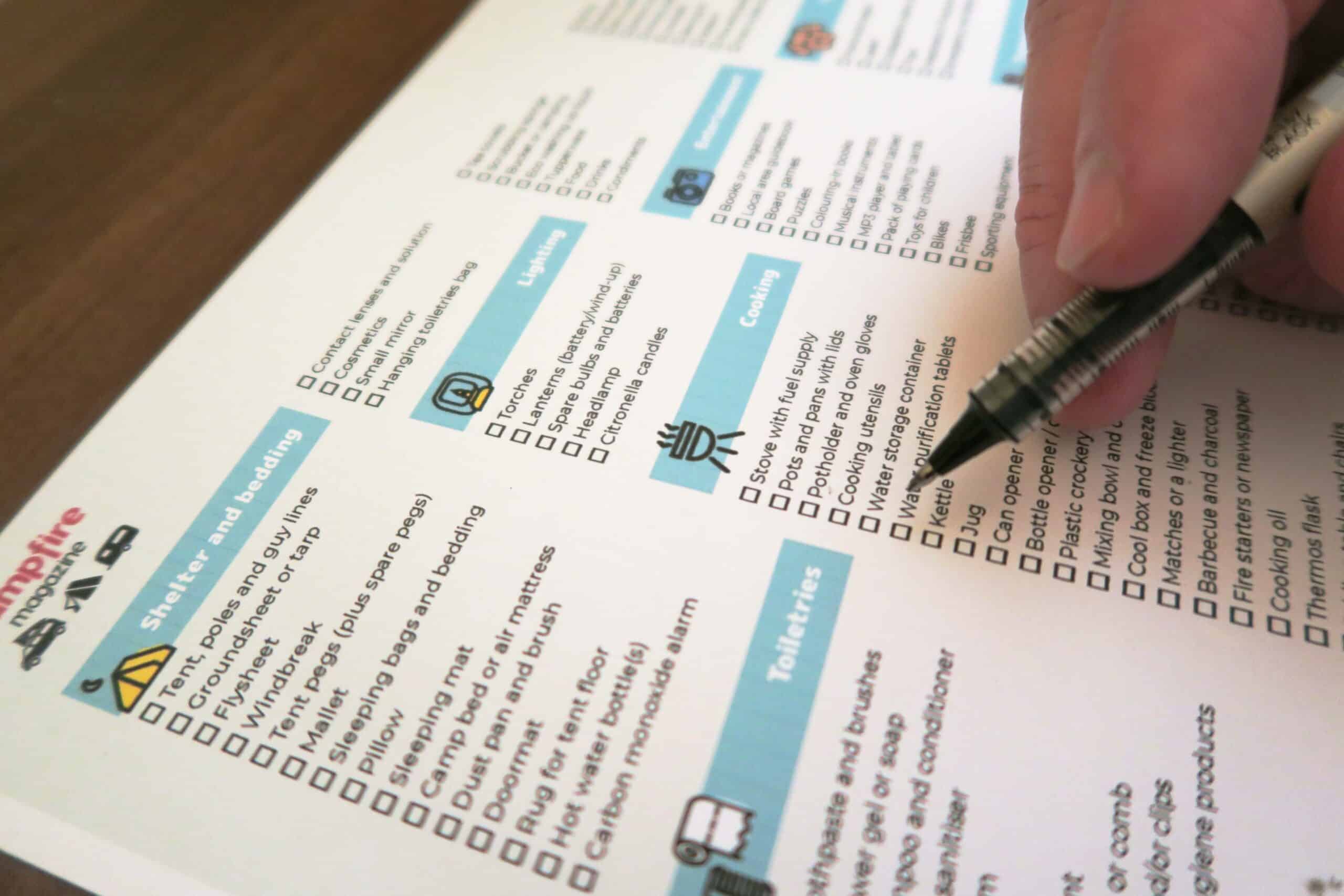Finding an appropriate parking area for a caravan can be slightly tricky. Every caravanner knows the struggle. It is especially perplexing for caravan owners to park in residential areas because while there are some benefits, several downsides are also there.
There are a bunch of rules to abide by when you park a caravan in a residential area.

How close can you park behind another vehicle? How close to a fire hydrant can you park? How to park to keep vandalism and theft at bay?
In this article, you will get an insight into everything you need to consider before parking your caravan so that you can avoid potential problems.
Can You Park Your Caravan on the Road Outside of Your House?
Yes, you can certainly park your caravan on the road outside of your residence. However, there are several rudimentary considerations that you’ll have to consider before you do so.
From the perspective of the police authority, you can park there as long as you aren’t causing any obstruction and parking carefully & responsibly.
A sensible caravaner must consider whether the way their caravan is parked poses any problem to other residents. So, always ensure that you park, keeping your neighbour's comfort in mind.
The nearside must face the pavement so that the rear lights face the rear for approaching traffic. That will give other cars a clear view of what lies before them. Check with your local council to find out what protocols they have for caravan parking. It is always wiser to be aware of how to park to be able to park properly.
Can You Park Your Caravan Across Your Own Driveway?
Unfortunately, you cannot park your caravan even across your own driveway unless you are picking up or dropping off passengers. That means you can only park on the driveway within the boundaries of your property.
Your caravan should not be parked anywhere outside your own property, even if it does not block any public footpath.
Caravan owners or any car owner, in general, should follow this protocol to avoid causing any hindrance on the footpath. It ensures the safety of children, older people, vision-impaired pedestrians, or anybody with mobility problems.
Check-In With Your House Deeds
Although there may be exceptions, usually, there are restrictions within your deeds that might prevent caravaners from parking their trailer on the street, even on their own driveway. These restrictions are known as restrictive covenants.
You must check your deed thoroughly before even purchasing a caravan. If you avoid them in the beginning, then you might have to face legal actions in the future.
So, you can prevent any sort of complication by being a little aware and cautious beforehand.

How Close to Another Vehicle Can You Park?
If there is a caravan parked in front or at the back, you must keep a distance of at least 5 meters in between. In the case of cars with no marked parking bays on the road, you must leave a minimum gap of one meter between your caravan and other cars.
This gives other drivers enough space to get in and out of parking spaces without facing any trouble. It also reduces unnecessary blockage.
How Close Can I Park to A Fire Hydrant?
Parking any vehicle, especially big ones, should strictly be done away from fire hydrants.
Few localities also have a rule not to stop vehicles anywhere within one meter of a fire hydrant, fire plug indicator, or fire hydrant indicator unless it is a bus zone or a taxi zone so that they are easily accessible in case of an emergency.
What to Do While Traveling?
If you are lucky enough to get access to a designated caravan park while traveling, you should not second guess parking your car there. These parks provide travellers with all sorts of amenities, starting from power to bathroom facilities.
However, finding a spot in an idyllic park can be a tedious task.
You can also safely park your caravan in and around campsites. They are amazing places to spend the night. We would recommend booking these places in advance to avoid any hassle later.
If you ever plan on parking your caravan outside of the designated parking space for caravans, then you must do some research about the local parking rules. Otherwise, you might end up paying fines.
Moreover, parking outside safe spaces can also pose a threat to the safety of your van, your belongings, and your own self. So, to have a successful and secure trip, make sure that you check out the local council laws and parking rules of every town or city you plan on visiting.
However, if such a situation occurs where you have no other option but to park your car on the street, you must always park on roads with working streetlights. Travellers are often advised not to park in a particular space for too long.
You can avoid parking in residential areas unnecessarily if you follow a few sets of rules. For instance, you can take frequent breaks at the gas stations to keep your tank full, buy new supplies, stretch your body, use the washroom, and do other such needful things to avoid parking in residential areas. That will save a lot of trouble.

Things to Keep in Mind
Dos
Registered caravans can be parked on the street for some time if and only if they are less than 7.5 m in length and weigh less than 4.5 tonnes.
You must keep your caravan safely hitched while it is being unloaded or loaded.
Wherever timed or permit parking restrictions apply, caravaners are obliged to comply with them.
You can hook up an unregistered caravan to a registered vehicle. However, you must always keep the length of both vehicles in mind to be able to park on the street safely.
Don’ts
Try not to hook up your caravan if you're not actively loading or unloading it.
Avoid parking trailers on nature strips or road verges.
Do not (under any circumstance) abandon your caravan on a residential street or nature strip (either permanently or temporarily).
How to Hook Up A Caravan/Trailer in A few Easy Steps
Move the caravan to a spacious area that is easily accessible.
Reverse the other vehicle that you are going to hook up your caravan to in a straight line with the caravan.
Carefully position the caravan coupler slightly above the hitch ball.
Lower the coupler socket onto the hitch ball of the vehicle.
Move the trailer jack out of the way.
Lock the coupler latch and insert the latch pin.
Carefully attach the safety chains in a cross pattern.
Secure the trailer.
Connect the lights.
Locate the wiring socket on the back.
Plug the trailer wire.
Test the brake lights, blinkers, and headlights of the caravan.
So, here is everything you need to know about parking a caravan. We hope every caravan owner, potential buyer, or enthusiast finds this article helpful.
If you are planning on buying a new caravan, ensure that you thoroughly read all the instructions and restrictions that you will have to follow once you bring your vehicle home. Once you have figured everything out, you are guaranteed to have a wonderful experience on the road.
Cheers to spending a bucket-load of good memories with your friends and family!

